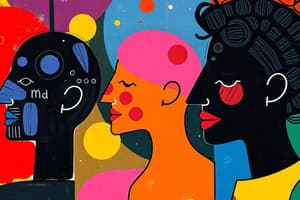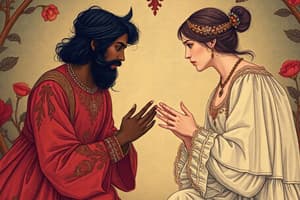Podcast
Questions and Answers
What is the primary argument Mills makes regarding personal troubles?
What is the primary argument Mills makes regarding personal troubles?
- They should be addressed through individual actions only.
- They are solely the result of personal characteristics.
- They have no significant connection to societal changes.
- They must be understood in connection to larger social issues. (correct)
Which of the following examples illustrates the concept of personal issues being influenced by societal changes?
Which of the following examples illustrates the concept of personal issues being influenced by societal changes?
- A community coping with natural disaster aftermath.
- A worker experiencing job loss due to company downsizing. (correct)
- An individual deciding to pursue higher education.
- A student struggling with time management.
According to Mills, how does industrialization affect social class structures?
According to Mills, how does industrialization affect social class structures?
- It maintains feudal systems of governance.
- It redefines occupational roles and class identities. (correct)
- It eliminates all forms of social class.
- It stabilizes existing class hierarchies.
In terms of the sociological imagination, what misconception might individuals have about unemployment?
In terms of the sociological imagination, what misconception might individuals have about unemployment?
Which sociologist is known for their work on the relationship between culture and society?
Which sociologist is known for their work on the relationship between culture and society?
Which statement best summarizes the relationship between personal and social issues as presented by Mills?
Which statement best summarizes the relationship between personal and social issues as presented by Mills?
Which of the following aspects of culture refers to shared beliefs about what is right and wrong?
Which of the following aspects of culture refers to shared beliefs about what is right and wrong?
What does Mills suggest happens to roles in society during times of war?
What does Mills suggest happens to roles in society during times of war?
What is the primary focus of sociobiology as indicated in the content?
What is the primary focus of sociobiology as indicated in the content?
How does Mills describe the effects of economic changes on individual lives?
How does Mills describe the effects of economic changes on individual lives?
Which cultural component includes signs and gestures that convey meaning?
Which cultural component includes signs and gestures that convey meaning?
Which of the following options reflects a typical individualistic viewpoint on societal issues?
Which of the following options reflects a typical individualistic viewpoint on societal issues?
In the discussion of globalization and the internet, what is likely a significant concern?
In the discussion of globalization and the internet, what is likely a significant concern?
Which sociologist is associated with the concept of symbolic interactionism within the provided content?
Which sociologist is associated with the concept of symbolic interactionism within the provided content?
What term describes a person's social position as defined by society?
What term describes a person's social position as defined by society?
Which resource is likely to provide insights on careers in sociology according to the content structure?
Which resource is likely to provide insights on careers in sociology according to the content structure?
What does Mills suggest is necessary to address large-scale unemployment issues?
What does Mills suggest is necessary to address large-scale unemployment issues?
Which social science is considered the first to emerge as a distinct discipline?
Which social science is considered the first to emerge as a distinct discipline?
How does Mills view the role of the sociological imagination in a person's life?
How does Mills view the role of the sociological imagination in a person's life?
What common belief about unemployment does the content challenge?
What common belief about unemployment does the content challenge?
Which early sociologist is mentioned as having studied law before engaging with sociology?
Which early sociologist is mentioned as having studied law before engaging with sociology?
In what century did sociology begin to establish itself as a distinct field of study?
In what century did sociology begin to establish itself as a distinct field of study?
What was a primary characteristic of early sociology in relation to political science?
What was a primary characteristic of early sociology in relation to political science?
What is a significant limitation of individual solutions to unemployment, according to the content?
What is a significant limitation of individual solutions to unemployment, according to the content?
What key aspect distinguishes oligarchy from other types of organizational structures?
What key aspect distinguishes oligarchy from other types of organizational structures?
In the context of group dynamics, what is most closely associated with 'groupthink'?
In the context of group dynamics, what is most closely associated with 'groupthink'?
Which factor most directly influences group formation according to group dynamics?
Which factor most directly influences group formation according to group dynamics?
What element is crucial for understanding the concept of conformity within groups?
What element is crucial for understanding the concept of conformity within groups?
Which theorist is associated with the study of group dynamics and leadership?
Which theorist is associated with the study of group dynamics and leadership?
In the context of formal organizations, what is a defining characteristic of bureaucracy?
In the context of formal organizations, what is a defining characteristic of bureaucracy?
How does globalization primarily impact social organizations?
How does globalization primarily impact social organizations?
The 'McDonaldization of society' refers to which of the following phenomena?
The 'McDonaldization of society' refers to which of the following phenomena?
What was a major reason Comte did not complete his university degree?
What was a major reason Comte did not complete his university degree?
What was Comte's relationship with Claude Henri de Rouvroy Comte de Saint-Simon characterized by?
What was Comte's relationship with Claude Henri de Rouvroy Comte de Saint-Simon characterized by?
Which of the following best describes Comte's view on sociology during his intellectual life?
Which of the following best describes Comte's view on sociology during his intellectual life?
In what capacity did Comte work with Saint-Simon during their collaboration?
In what capacity did Comte work with Saint-Simon during their collaboration?
What distinctive phase of Comte's career is known for the production of his intellectual writings?
What distinctive phase of Comte's career is known for the production of his intellectual writings?
What caused Comte to lose his position at the Ecole Polytechnique?
What caused Comte to lose his position at the Ecole Polytechnique?
Which of the following terms is most closely associated with Comte's contributions during his second intellectual period?
Which of the following terms is most closely associated with Comte's contributions during his second intellectual period?
What was a significant personal trait of Comte during his educational experience?
What was a significant personal trait of Comte during his educational experience?
Flashcards are hidden until you start studying
Study Notes
Major Sociological Figures
- Merton, Parsons, Spencer, Weber are prominent figures in sociology, each contributing unique perspectives and theories.
- Career opportunities in sociology are diverse, encompassing various fields such as research, teaching, and policy analysis.
Chapter 3: Culture and Society
- Culture encompasses shared beliefs, values, and practices within a society.
- Different types of culture include material and non-material culture, influencing societal norms and practices.
- Society is defined by social structures that organize individuals into groups.
- Social structure includes components like status (one's social position) and roles (expected behaviors associated with status).
- Aspects of culture consist of values (core beliefs), norms (rules guiding behavior), symbols (representations), and languages (systems of communication).
- Diversity within cultures enhances societal complexity.
- Sociobiology examines the relationship between biology and social behavior.
- Globalization impacts culture and society by facilitating widespread exchange of ideas, goods, and information through the internet.
- Notable figures in sociology include Chagnon, Harris, McLuhan, Sumner, Whorf, and Thomas, each contributing to the understanding of cultural dynamics.
Chapter 5: Social Groups and Organizations
- Social groups are characterized by shared interests or identities, influencing member behavior and interpersonal dynamics.
- Reference groups serve as benchmarks for evaluating one's behavior and attitudes.
- Group size affects dynamics, with larger groups often fostering greater anonymity and complexity.
- Networks illustrate social connections among individuals, facilitating resource exchange.
- Group dynamics reveal patterns in formation, leadership, power relations, and conformity.
- Leadership styles impact group effectiveness and member satisfaction.
- Conformity is influenced by group pressure and societal expectations, while obedience pertains to following authority.
- Group decision-making processes can lead to consensus or conflict.
- Institutions shape conformity through established rules and norms.
- Formal organizations, like bureaucracies and oligarchies, organize societal functions.
- The concept of "McDonaldization" describes the spread of efficient organizational principles across society.
- Globalization and the internet significantly affect how organizations operate and interact.
Sociological Imagination
- Mills emphasizes the necessity of a sociological perspective to understand personal experiences within larger societal contexts.
- Personal issues, such as unemployment, often stem from structural societal problems rather than individual failings.
- Sociological imagination enables individuals to navigate social forces, leading to greater control over their lives and ability to effect change.
Development of Sociology
- Sociology emerged as a distinct academic discipline in the 1800s, evolving from earlier social sciences like economics, psychology, and anthropology.
- Early sociologists drew from various fields, including law, to shape the foundations of sociology.
- Comte, an early founder of sociology, advocated for a scientific approach to studying society through observation and comparison.
- Comte’s intellectual journey consisted of three phases, from collaboration to developing positivism, and ultimately to establishing a religious framework for sociology.
Key Concepts
- Understanding the interplay between individual experiences and societal structures is crucial for grasping sociological concepts.
- Solutions to societal issues require a collective examination of social structures rather than solely focusing on individual behavior.
Studying That Suits You
Use AI to generate personalized quizzes and flashcards to suit your learning preferences.




